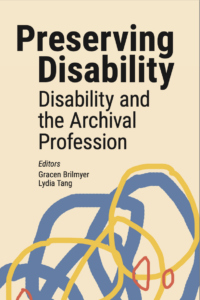Preserving Disability
Disability and the Archival Profession
Editors: Gracen Brilmyer and Lydia Tang
Price: $75
Published: December 2024
ISBN: 978-1-63400-149-6
728 pages
Series on Archives, Archivists and SocietyBook Launch Events:
- Part 1 (Feb. 10, 2025)
- Part 2 (Feb. 20, 2025)
This book is number 10 in the Series on Archives, Archivists, and Society, Michelle Caswell, editor.
Download the introductory chapter.
“We are honored that Alice Wong wrote a foreword for our book. We offer it here to amplify her words. Rest in power.” -Editors
Preserving Disability: Disability and the Archival Profession weaves together first-person narratives and case studies contributed from disabled archivists and disabled archives users, bringing critical perspectives and approaches to the archival profession. Contributed chapters span topics such as accessibility of archives and first-person experiences researching disability collections for disabled archives users; disclosure and accommodations and self-advocacy of disabled archivists; and processing and stewarding disability-related collections. Collectively, these works address the nuances of both disability and archives—critically drawing attention to the histories, present experiences, and future possibilities of the archival profession.
Dr. Gracen Brilmyer is an Assistant Professor in the School of Information Studies at McGill University and the Director of the Disability Archives Lab. Their research lies at the intersection of feminist disability studies, archival studies, and the history of science, where they investigate the erasure of disabled people in archives primarily within the history of natural history museums and colonial histories. This historical-archival research is complemented by empirical research on how living disabled people use and experience archives today. Their work has been featured in publications such as The Journal of Feminist Scholarship, Archival Science, and First Monday. Their research is shaped by their experiences as a white, Disabled, non-binary person. For more: gracenbrilmyer.com
Dr. Lydia Tang is an Outreach and Engagement Coordinator for LYRASIS. Previously, she held archivist positions at Michigan State University, the Library of Congress, and numerous graduate positions at the University of Illinois, where she received her MLIS and Doctor of Musical Arts degree. Passionate about accessibility and disability representation in archives, she served on the Task Force to Revise the Best Practices on Accessible Archives for People with Disabilities and spearheaded founding the Society of American Archivists’ (SAA) Accessibility & Disability Section (ADS). She is the 2020 recipient of SAA’s Mark A. Greene Emerging Leader Awardand was recognized in three SAA Council resolutions as a co-founder of the Archival Workers Emergency Fund, for spearheading the Accessibility & Disability Section’s“Archivists at Home” document, and for the “Guidelines for Accessible Archives for People with Disabilities.” In addition to her professional service with SAA, she has contributed to accessibility initiatives within DLF Digital Accessibility Working Group and the ArchivesSpace open source software and community by leading the Staff Interface Enhancement Working Group, Development Prioritization subteam, founding the Usability subteam, and chairing the Users Advisory Council.
Table of Contents
Acknowledgements
Foreword
Alice Wong
Introduction
Gracen Brilmyer and Lydia Tang
Using Archives & Witnessing Oneself The Royal Commission of Inquiry Into Abuse in State and Faith-Based Care in Aotearoa New Zealand and the Opportunity it Provides to Hear, Research and Archive Stories of Disability History
Hilary Stace, Susan Martin, and Martin Sullivan
Including Japanese American Disability History in the Archives
Selena Moon
Seeing Sickness: Archival and Embodied Encounters with the Medical Panopticon
Alexandra Pucciarelli
Uncovering the Past, Hiding Myself: Exploring the Archive through Autoethnography
Emma Yeo
Making Sex in the Archive More Accessible: A Call for Preserving Accounts of the Sexual Experience of People with Disabilities by People with Disabilities
Cassandra J. Perry
It’s so Liberating to Do the Work: Education in Archives Creates Space for People with Disabilities
Julia Pelaez and Jen Hoyer
Navigating Employment Exploratory Archives as Community Care: A Self-Reflection
Iris Afantchao
Are You the Gatekeeper?: Job Advertisements as Barriers to Employment for Disabled Archivists
Chris Tanguay and Ann Abney
“Once I show up… they’re not going to hire me”: Job searches, interviewing, and disclosure for disabled archivists
Veronica L. Denison, Gracen Brilmyer and Tara Brar
The Intersection of Personal and Professional Bodies: Disability, Mutual Aid, Covid-19, and the Archives
Jennifer McGillan
“Ability to Lift” Your “Little Black Clouds”: How to Not Exclude Disabled Archivists in Employment
Zachary Tumlin and David Spriegel
Doing the Work From Collecting to Curating: The History and Mission of the Deaf Catholic Archives
Rev. Joseph Bruce, S.J., Abby Stambach, Corinne Tabolt, and Lisa Villa
Accessing Athens: Archiving Adaptive Sports
Amanda McGrory and Joel Blanco
Teeming With Troublesome Terms: Remediating Problematic Language Describing Disability in Special Collections
Melissa Weiss, Jacquelyn Slater Reese, and Jay A. Edwards
Disability in Archival Equity, Diversity, and Inclusion Initiatives
Talea Anderson, Greg Matthew, and Gayle O’Hara
From Collection to Collaboration: Disability Studies/Archives Collaboration and the Hahn Disability Collection
Thomas Philo and Nancy Armstrong-Sanchez
“But Don’t Those Cause You Seizures!?”: Epilepsy Activism through Film Archiving
Michael Marlatt
Existing in Plain Sight: On Being a Black Archivist with Non-Visible Disabilities
Jessica C. Neal
Does “Nothing About Us Without Us” Include Me?: How Preserving Disability History Helped Me Recognize My Own Identity as a Disabled Archivist
Lauren White
Process and Lessons Learned from an Accessibility Audit at the Central Washington University Archives and Special Collections
Julia Stringfellow and Lauren Wittek
The Evolution and Importance of Sustainable Accessible Online Cultural Heritage Materials
Erin Baucom
Rehousing Archivists: Attending to a Livable Future for a Black, Queer Disabled Memory Worker
Zakiya Collier
Author Bios
Index
